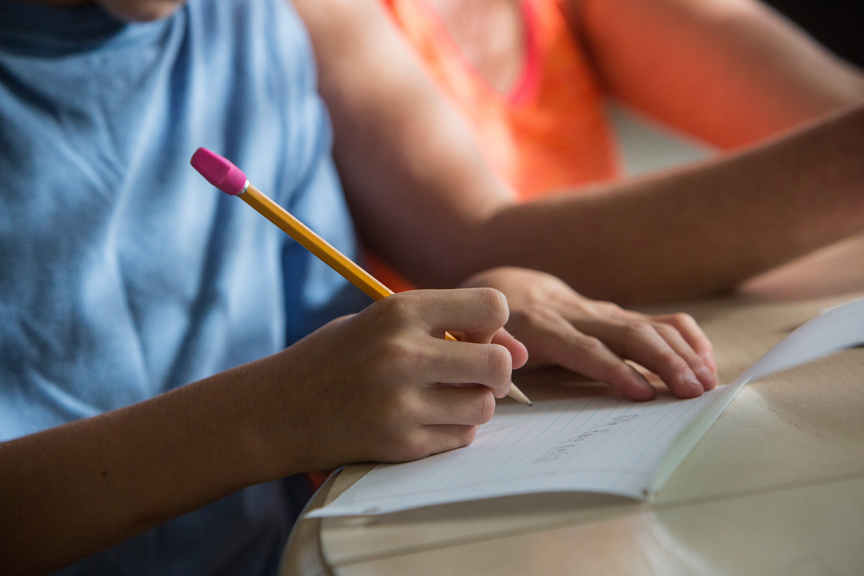- Education
- Health
- Parenting
My child's not keeping up with other kids! What should I do?

In this article, you will find answers to questions like:
- What's normal for ages 5-8?
- Should I trust my instinct?
- What local groups can help?
All children develop at their own pace. But how do you know if your child might have a developmental challenge or delay?
First, it helps to know what your child should be doing at each stage of life.
1. WHAT'S NORMAL FOR AGES 5-8?
For example, children by age 5 can copy patterns, print some letters, cut with safety scissors, recall parts of a story, want to please their friends, and sing and dance around.
By ages 6 to 8, children’s vocabulary can increase to about 2,000 words or more, according to the AboutKidsHealth website. They’ll learn their left and right, begin to reason (and argue) using words like “why” and “because.” They’ll develop a longer attention span, understand fractions and the concept of space, understand money and learn how to tell time. They also enjoy reading books on their own.
2. SHOULD I TRUST MY INSTINCT?
If you notice your child isn’t doing things other children the same age are doing, trust your judgment and alert your child’s doctor as soon as possible. You also can take action on your own. Observe your child. If you notice over time that your child is consistently not keeping up with friends, you can reach out for help in the community. Early intervention services often can help a child catch up to peers.
3. WHAT LOCAL GROUPS CAN HELP?
You can call the free 211 HelpLine and ask for Help Me Grow or the Special Needs Helpline. The 211 specialist will ask you questions and usually can find you help within 24 hours. The 211 specialist also will call you back in a few weeks to check on you. The 211 specialists start by helping them keep a roof over their heads, find food pantries and secure help paying the electric bill, if needed. They also ask every caller if they have young children and if they are having any problems at school or home.
“I say to them, we’re free, we’re confidential, and there may be resources out there that we can help them tap into,” says Jennifer Harris, a Special Needs advocate for 211.
The Palm Beach County School District also offers help for children. Start with your child’s teacher and your school’s guidance counselor. If you need additional information or still have concerns, reach out to the district’s exceptional student education department at 561-434-8740.
Whatever your concern as a parent, don’t panic. Palm Beach County has resources that can help.
SOURCES:
• Randee Gabriel, programs manager, 211 Palm Beach/Treasure Coast
• Jennifer Harris, Special Needs advocate, 211 Palm Beach/Treasure Coast
• Kevin McCormick, director of Exceptional Student Education, School District of Palm Beach County
• Sharon Alexander, chief executive officer, Unicorn Children’s Foundation
• AboutKidsHealth
You May Also Like
-
- Behavior
- Education
- Parenting
How to teach academic and personal skills to excel in school
Children must possess an array of tools and skills to be successful in school. Here’s how you can nurture those at home. …
Read More -
- Behavior
- Education
- Parenting
Prepare for big steps of kindergarten and third grade
Don't be surprised to find that kindergarten is more academic these days, and academic standards jump dramatically in third grade. Read on for insight from our local experts on wha …
Read More -
- Health
- Parenting
- Safety
How can I tell if my little one needs emergency treatment?
If your child breaks a bone, you’ll likely make a mad dash to the emergency room, no questions asked. But it’s a bit trickier with a stubborn fever or lingering headache. Read on t …
Read More
Related resources
-
- Behavior
- Health
Autism Navigator
A collection of web-based tools and courses that uses extensive video footage to bridge the gap between science and community practice. The navigator was created by faculty and staff in the Autism Institute at the Florida State University College of Medicine. The website includes resources for families.
1-84-427-3457 Website -
- Behavior
- Education
- Parenting
Autism Speaks
Advocacy, information and support for families, caregivers and people with autism.
202-955-3111 Website Email -
- Behavior
- Education
- Parenting
Children and Adults with Attention-Deficit/Hyperactivity Disorder (CHADD)
Based in Wellington, Palm Beach chapter of a national resource for families of children with attention and hyperactivity issues
1-866-200-8098 Website Email -
- Education
- Health
School District of Palm Beach County
Child Find — screening, evaluation, services and placement of children with special learning needs
561-434-7337 Website -
- Education
- Health
- Parenting
Florida Atlantic University - Center for Autism and Related Disabilities
Free information, training and support based in Boca Raton for people with autism and related disabilities, as well as for their families and employers
561-213-5751 Website Email -
- Behavior
- Education
- Health
211 Palm Beach Treasure Coast
Help Me Grow – information, guidance and developmental assessment of children up to age 8
2-1-1 Website Email -
- Behavior
- Education
- Health
211 Palm Beach Treasure Coast
Special needs hotline
2-1-1 Website Email -
- Education
- Parenting
Dyslexia, Learning and Support Group Florida
Helps parents and teachers navigate the community's resources to assist children with specific learning disabilities
561-601-5883 Website Email
